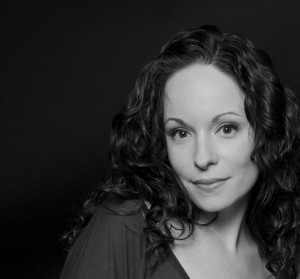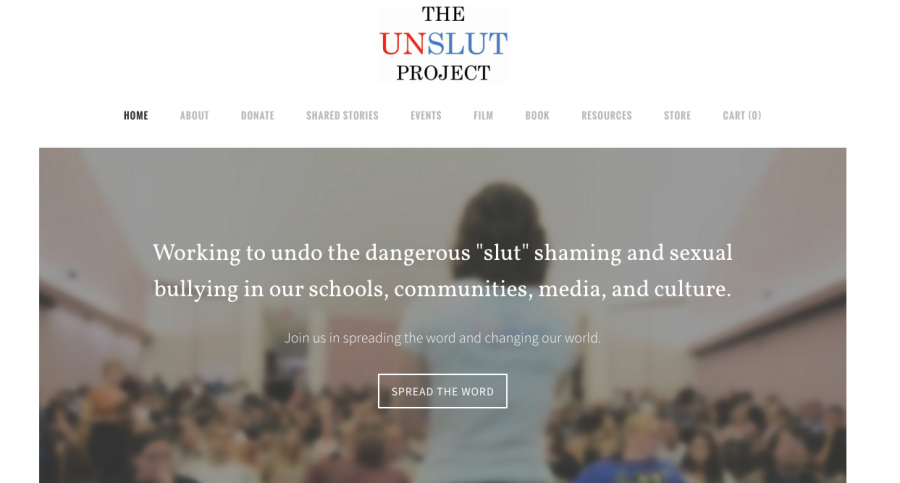Activist Emily Lindin takes a stand against sexual shaming
Republican presidential candidate Donald Trump released a string of tweets on Sept. 30 in an attempt to discredit former Miss Universe Alicia Machado, a supporter of Democratic candidate Hillary Clinton about whom Clinton had spoken during the Sept. 26 presidential debate.
In his tweets, Trump shamed Machado for her sexual history, calling her “disgusting” and urging users to “check out her sex tape and past.”
Trump’s focusing on women’s sexual lives as a way to demean and control them is so prevalent that it has its own term: “slut shaming.”
Shaming occurs within domestic settings, in workplace environments, at schools and universities and especially in social media communities.
“Shaming implies that a girl is only defined by whether or not she’s had sex, whether or not she has breasts, what her body looks like, if she flirts, if she dates,” said San Jose activist and founder of the Unslut Project, Emily Lindin. “It implies that that’s the sum total of her being and her worth.”
The word “slut” is used in a range of contexts, from a belittling joke that friends use to a disparaging insult whispered behind backs or behind the secrecy of closed doors or anonymous comments.
“I don’t think there is one working definition for ‘slut’ given the way it’s used—I define it as a catch-all insult for girls and women to remind us of our current place in the world,” Lindin said. “It’s always uneccessary as a joke, and it carries pain and harm when it’s used as an insult.”
In Lindin’s case, it was said right to her face. When Lindin was in sixth grade, she was labeled the “school slut.”
Years later, she heard about the deaths of 15-year-old Canadian Amanda Todd and 16-year-old Saratoga High School Audrie Pott in 2012 and 17-year-old Rehtaeh Parsons (also Canadian) in 2013. All three young women took their own lives after being sexually bullied.
Lindin recalled what she had gone through as a child and decided to give voice to all those subjected to sexual shaming by sharing her story.
In 2013, she published her middle school journal entries online, and they became the foundation of her book, “Unslut: A Diary and a Memoir”, her documentary, “Unslut: A Documentary Film” and her organization, the Unslut Project.
As an activist, Lindin has encouraged others to share their own stories, witnessing the strides various communities have taken towards the prevention of sexual bullying.
“The UnSlut project is rooted in personal story sharing because often, it can be hard for people to change their mind about the acceptance of women’s sexuality unless we make it personal and tell our own experiences, how hurtful it’s been for us and how we’ve struggled,” Lindin said.
According to Lindin, sexual bullying and stigmatization can be stopped with the collective involvement of both adults and students. “Now, It seems like girls are finding their voices and feeling more empowered to speak up about their own experiences,” she said.
Lindin emphasized that, while most high schoolers preoccupy themselves with their self-image, the most important qualities one can have are confidence and kindness.
“What matters is that you have confidence in yourself, that you feel that how you spend your time is making someone out there a little bit happier. As long as you’re doing that, it doesn’t matter what other people say and think, because you really can’t control it. What you can control is how you treat other people,” she said.
Q&A with Katie Cappiello, activist and playwright Courtesy of Katie Cappiello
Courtesy of Katie Cappiello
Katie Cappiello is the co-director of the Arts Effect All-girl theater company in New York. She is the founder and co-director of several original theatre production including “SLUT”, a play that examines sexual bullying attitudes surrounding girls and women in modern society, and she is an honoree of the National Women’s Hall of Fame.
Winged Post: How does sexual shaming extend beyond the female community?
Katie Cappiello: People of all genders are sexually shamed. I think feminist statements should create room for all genders to have conversations about what’s happening to them. So when we talk about sexual shaming when it comes to girls, we can also open the door and discuss the sexual shaming that boys face too. Because they do, and often at the hands of other boys. And we don’t give boys a lot of space to talk about that, but it’s important to open the door to that conversation as well.
WP: How do we push aside the jokes and insults involved in shaming culture and initiate a serious dialogue about gender equality?
KC: The first step is to acknowledge e sexual shaming language that we have about people of all genders: people of the trans community, people who identify as agender and boys––the sexual shaming that happens with boys. The language around boys when they don’t want to hook up, when they don’t pressure a girl to do a certain thing, when they don’t act ‘manly.’ The first thing is to call it out and call it what it is, to not sugarcoat it, and from there it’s resisting the urge to use this language- even with how it’s so deeply embedded in our culture.
This piece was originally published in the pages of The Winged Post on October 11, 2016.
Prameela Kottapalli (12) is the Editor-in-chief of the Winged Post. She enjoys spending time with her fellow staff members...
Nicole Chen (12) is Harker Aquila's Editor-in-Chief. She joined the journalism program in her freshman year as a reporter and became features editor as...


















![“[Building nerf blasters] became this outlet of creativity for me that hasn't been matched by anything else. The process [of] making a build complete to your desire is such a painstakingly difficult process, but I've had to learn from [the skills needed from] soldering to proper painting. There's so many different options for everything, if you think about it, it exists. The best part is [that] if it doesn't exist, you can build it yourself," Ishaan Parate said.](https://harkeraquila.com/wp-content/uploads/2022/08/DSC_8149-900x604.jpg)




![“When I came into high school, I was ready to be a follower. But DECA was a game changer for me. It helped me overcome my fear of public speaking, and it's played such a major role in who I've become today. To be able to successfully lead a chapter of 150 students, an officer team and be one of the upperclassmen I once really admired is something I'm [really] proud of,” Anvitha Tummala ('21) said.](https://harkeraquila.com/wp-content/uploads/2021/07/Screen-Shot-2021-07-25-at-9.50.05-AM-900x594.png)







![“I think getting up in the morning and having a sense of purpose [is exciting]. I think without a certain amount of drive, life is kind of obsolete and mundane, and I think having that every single day is what makes each day unique and kind of makes life exciting,” Neymika Jain (12) said.](https://harkeraquila.com/wp-content/uploads/2017/06/Screen-Shot-2017-06-03-at-4.54.16-PM.png)








![“My slogan is ‘slow feet, don’t eat, and I’m hungry.’ You need to run fast to get where you are–you aren't going to get those championships if you aren't fast,” Angel Cervantes (12) said. “I want to do well in school on my tests and in track and win championships for my team. I live by that, [and] I can do that anywhere: in the classroom or on the field.”](https://harkeraquila.com/wp-content/uploads/2018/06/DSC5146-900x601.jpg)
![“[Volleyball has] taught me how to fall correctly, and another thing it taught is that you don’t have to be the best at something to be good at it. If you just hit the ball in a smart way, then it still scores points and you’re good at it. You could be a background player and still make a much bigger impact on the team than you would think,” Anya Gert (’20) said.](https://harkeraquila.com/wp-content/uploads/2020/06/AnnaGert_JinTuan_HoHPhotoEdited-600x900.jpeg)

![“I'm not nearly there yet, but [my confidence has] definitely been getting better since I was pretty shy and timid coming into Harker my freshman year. I know that there's a lot of people that are really confident in what they do, and I really admire them. Everyone's so driven and that has really pushed me to kind of try to find my own place in high school and be more confident,” Alyssa Huang (’20) said.](https://harkeraquila.com/wp-content/uploads/2020/06/AlyssaHuang_EmilyChen_HoHPhoto-900x749.jpeg)



